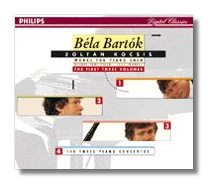
The Internet's Premier Classical Music Source
Related Links
- Bartók Reviews
- Latest Reviews
- More Reviews
-
By Composer
-
Collections
DVD & Blu-ray
Books
Concert Reviews
Articles/Interviews
Software
Audio
Search Amazon
Recommended Links
Site News
 CD Review
CD Review
Béla Bartók

Works for Piano, Vols. 1-3
- 14 Bagatelles
- 2 Élégies
- 6 Roumanian Folk Dances
- Sonatina
- 3 Hungarian Folk Tunes
- 2 Roumanian Dances
- 3 Hungarian Folk Songs from Csik
- Allegro Barbaro
- 4 Dirges
- Suite
- Roumanian Christmas Carols
- 3 Studies
- 3 Rondos on Folk Tunes
- First Term at the Piano
- For Children
- Piano Concerto #1
- Piano Concerto #2
- Piano Concerto #3
Zoltán Kocsis, piano
Budapest Festival Orchestra/Iván Fischer
Philips 446368-2 4CDs About 4 hours
Often when we hear our favorite composers' early works, it is like going through their laundry drawer. We're embarrassed or amused at what we find, as well as relieved we seldom see it shown in public. With these Bartók's solo piano works, most written before he was forty, the seams and rents are readily visible. But if we listen closely enough, we find pieces of remarkable strength and flexibility. Along with the callow experiments, there are flashes of innovation. This 4-CD set is a fine introduction to both sides of Bartók's early creative development.
The two-minute Allegro Barbaro suite (1911) is an awesome lightning bolt that presages his later use of the piano as a percussive instrument. There are stunning shifts in tempo and timbre in this brutal little piece, which – to Bartók's chagrin – became quite a crowd-pleaser in his later years. In his Suite Op. 14, he begins to merge folk quotations with frenetic forays into dissonance, "a style of bone and muscle," as he termed it. Its final movement is capped with melancholy, possibly for his lost mistress Klára. Three Studies Op. 18 starts as a probing journey, flirts with late romanticism, then leaps jaggedly, exultantly, into atonality. The trim 14 Bagatelles Op. 6 are reactions against the excesses of 19th Century music, experimental mood pieces that reject decorative elements. Then there are the transcriptions and adaptations of folk tunes, the Romanian and Hungarian dances, Christmas carols and the Rondos on Folk Tunes. Some of these are moderately interesting, mostly to the scholar, and one night's listening goes a long way. Curiously, Philips has dedicated a whole disc to his four-volume set For Children, an inconsequential teaching piece that pales in comparison to the monumental Mikrokosmos (1926-1939), which was not included in these first three volumes. However, the company has tossed in a bonus CD of the three piano concertos. Pianist Zoltán Kocsis performs them adequately, although not as well as the solo pieces. Both he and the Budapest Festival Orchestra, led by Iván Fischer, fail to inject these pieces with drama and dazzle. Compare them to the stunning performances by pianist Vladimir Ashkenazy and conductor George Solti (Decca, 1984) and you will hear the difference between the a talented and a greatly gifted performance.
Copyright © 1997, Peter Bates


















